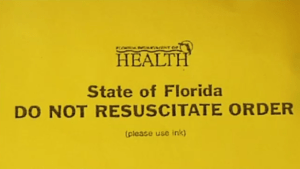 I often get calls from people who tell me they need a Living Will. But when I ask them a few more questions, I know they actually mean they need a Last Will and Testament. So, what’s the difference?
I often get calls from people who tell me they need a Living Will. But when I ask them a few more questions, I know they actually mean they need a Last Will and Testament. So, what’s the difference?
A Will (or Last Will and Testament) is the legal document that tells a probate judge three main things:
- Who you’d like the probate judge to appoint as the Personal Representative (Executor) of your estate during a probate proceeding;
- Who you’d like a guardianship judge to appoint as the legal guardian of your minor child if neither parent is alive; and
- Who your Personal Representative should give your stuff to after the probate proceeding is done.
A Will is what we estate planning attorneys call a “dispositive document”; that’s just a fancy term for a legal document that directs how you’d like to dispose of your assets when you’re dead. In Florida, your Will has absolutely no legal effect until you die and it’s presented to a probate judge. We don’t record Wills while you’re alive because that’s just silly – you may change your Will a dozen times before you die. Only the one in effect on the day you die matters.
A Living Will, on the other hand, is effective only while you’re technically alive – as soon as you’re declared dead (“Time of death: 7:21 am”), it terminates. So, if you’re brain dead but your body is being kept “alive”, it’s still in effect.
Some people call a Living Will the “pull-the-plug” document because it tells medical personnel and your Health Care Surrogate that you don’t want CPR or artificial respiration, artificial hydration, or artificial nutrition, or any other extraordinary measures taken if you’re at the end of your life or in a persistent vegetative state and your lungs or heart stop working on their own. Some states call this document a Declaration of Desire for a Natural Death, which I personally think is far more accurate and descriptive than Living Will.
Your Living Will gives your Health Care Surrogate the authority to request that your doctor sign a Do Not Resuscitate Order (DNR) if you’re not able to do so yourself.
Hospitals often hand out 1-page Living Will forms like candy. It’s fine to sign one before an unplanned surgery, but remember they’re generally hospital specific. If you want a Living Will, you should have one that’s legal anywhere, in any state. In Florida, a Living Will is a legally enforceable document – your Health Care Surrogate must enforce it, not override it. But other states (such as MA) consider Living Wills merely an unenforceable wish, and your Health Care Surrogate’s orders – not your Living Will – will be followed.
Some states’ Living Wills (such as IL) only cover “terminal conditions” where death is “imminent”; others, like Florida, cover terminal conditions, end-stage conditions, and persistent vegetative states – from which death isn’t always “imminent.” Be sure you’re clear on your state laws. Also, if you use your Florida Living Will in another state, be aware that, while your document is legally valid, that state’s Living Wills laws may supersede Florida’s laws in some respects.
Other articles you may find interesting:
Why Would I Need a Durable Power of Attorney?
Don’t Put Money into Property You Don’t Own
Ready to make sure everything’s in order for your loved ones in the event you become incapacitated or die? Give Manasota Elder Law a call at 941-444-5958. We’ll help you determine whether you’re all set, or whether there are still some things that need to be done to protect what’s most important to you … your family.








